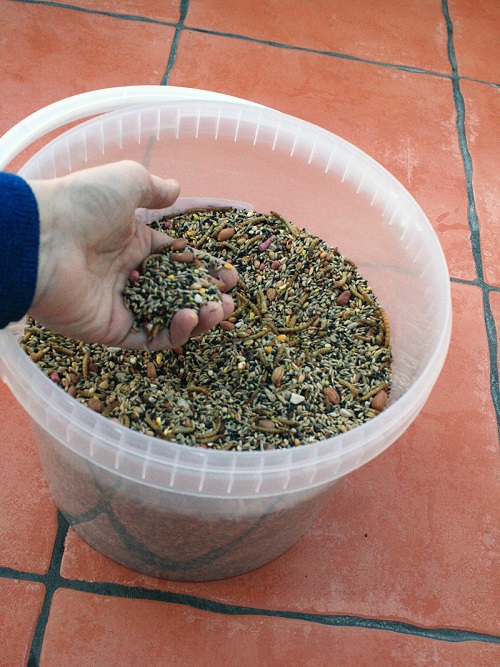WE all enjoy the best of everything over Christmas and the New Year. It’s a time we push the boat out in the kitchen to make things extra special. In the depths of mid-winter when the days are shortest and the outlook is bleak, we try to give ourselves a pick-me-up by enjoying the richest food and strongest drinks.
But for Dúlra, all this excess is hard to stomach when, outside the kitchen window, his numerous garden pals who he has shared so much fun with over the past 12 months are struggling like never before. They’re getting buffeted by gales, sub-zero temperatures, sleet and snow. The landscape most of them were born into – the lush green of Belfast’s hills and gardens – is like a far-off mirage.
And so Dúlra decided that this year, they’d get some special treatment. So with the care of Mary Berry baking a Christmas cake and using a lifetime of experience feeding wild birds, he set about making the ultimate superfood.
And here it is.
Like Colonel Sanders’ top secret KFC recipe, its exact ingredients will remain a mystery, but its effect on the birds of Dúlra’s garden has been truly spectacular.
As soon as he scatters a few handfuls on the path in the morning, it’s as if the Belfast hills come alive as word spreads. Dúlra’s Avian Diner is open for business.
In fact this week it seemed as if word of Dúlra’s diner had even reached Scandinavia as the clearly foreign blackbirds and thrushes descended on his garden. You know they’re blow-ins not because they sing with a foreign accent, but because they behave so differently. Unlike birds who have spent a summer lounging about your garden, the newcomers are positively jittery and nervous like refugees taking their first steps in a new land.
The food itself has canary mix as its staple, in much the same way spuds are the basis of all our great dinners. The wild bird food that you can buy in shops has, for Dúlra, too many large, husky seeds.
Maybe they’re cheaper or just that they help fill the bag, but if you want to support ground-feeding finches rather than pigeons, then the smaller canary mix seeds like red and black rape, niger and hemp are the best.
Hemp – a form of the cannabis plant – is dearer than the rest, so Dúlra invested in a bag of pure hemp for his superfood. Then he added cheaper wild bird food, a handful of peanuts, a bag of mealworms, softbill food for robins and dunnocks, some sunflower hearts and seasoned with salt and pepper (only joking!).
As Ryan Tubridy would say, there’s something for everyone in the audience. Even the tits that normally feed on the hanging bags have rolled back the last few decades of evolution and land on the ground for their favourite morsel.
Dunnocks, robins, thrushes, wrens, chaffinches are all flocking to Dúlra’s home like never before, as do magpies, the odd jay, wood pigeons and collared doves.
He’s never experienced such an influx. Maybe he should package it as Dúlra’s Special Recipe Bird Food and sell it to the public. But he’ll have to put a warning on the pack: Beware – your garden could be swamped with wild birds.
If you’ve seen anything interesting or have any nature questions, you can text Dúlra on 07801 414804. Reader, Glenbawn, Poleglass: There’s a grey wagtail feeding in my neighbour’s garden out of a mucky puddle where concrete slabs have been dug up. I’ve had all sorts of birds over the years but never a grey wagtail. Is it normal to see them in a garden and how could I attract them?
Dúlra writes: Greg wagtails are a particularly beautiful bird, but unless you’re going to make a pond in your garden, they are hard to attract. Dúlra will do some research and see if he can include their food in his special wild bird mix!





